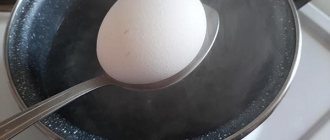Eggs are one of the most popular food products, and many housewives prefer to buy them for future use. To maintain the freshness of eggs at the maximum level, it is important to create certain conditions for this. Each method of storing eggs has its own nuances. The choice of method depends on the form in which the product is stored, as well as the date of its production.
Techniques for determining freshness
Techniques for determining freshness
Put ???? and subscribe to the channel “Svekrovi.Net”. This will allow us to publish more interesting articles.
How long to store - in shell or without?
The overall shelf life of raw eggs depends on the cleanliness and integrity of their shells. Since the shell is porous, any contamination quickly penetrates inside and spoils the contents, causing rot. Therefore, for long-term storage it is better to choose specimens with a clean, undamaged surface .
Do not wash with water before storing! The liquid, penetrating inside the shell, promotes the growth of bacteria and spoilage of the product. The soiled surface should be washed immediately before cooking.
You can find out how long broken eggs last in the refrigerator here.
In a refrigerator
Placed in a compartment where the temperature is maintained no higher than +4 degrees, the eggs are stored for 15-18 days. The shelled product is suitable for use within 2 days. The semi-liquid mass is kept in a glass, tightly closed jar or plastic container.
In room conditions
At a temperature of +20 +24 degrees, a raw egg in an intact shell will not spoil within 5-7 days. Once broken, it should be consumed within a few hours .
In the cellar
If there is no refrigerator, for example in a country house, raw eggs can be placed in a cellar or vegetable pit.
Even in the summer heat, the temperature there rarely exceeds +10 degrees, which almost corresponds to the parameters of the refrigerator compartment.
The cellar usually has high humidity, which is detrimental to long-term storage. Before storing in the cellar, the product must be placed in a plastic bag .
In the well
An original and very effective solution, since well water has a constant temperature of +4 +7 degrees. The eggs are placed in a tightly closed container that does not allow water to pass through, and they are lowered down on a rope so that the container with the product is in the water.
How to check the freshness of eggs
How to determine the freshness of an egg using water (photo source: Yandex.Images)
How to determine the freshness of an egg using water (photo source: Yandex.Images)
A unique test will help you avoid poisoning and salmonellosis, as well as ensure the quality of the product used. Before storing or eating eggs, you should check them for freshness. There are several methods for this.
Method 1: test in salt solution
Place a raw egg in a jar of saline solution (1 tablespoon per liter). Fresh ones will lie on their side at the bottom or rise slightly above the liquid level. If the egg floats or hangs in the solution, it means it is rotten.
Method 2: test in a frying pan
Crack the egg over a bowl to assess the condition of the white and yolk. The old product will not look cohesive, will become less compact and will spread over the surface. Loss of freshness is indicated by a watery consistency, a flat, easily bursting yolk, free floating of the yolk, and a transparent white (a bad product does not have a smoky tint to the white).
Method 3: by sound
Shake the egg against your ear and listen to the noise the liquid makes. If you don't hear anything, the product is fresh. If the sound of squelching is distinct, then most likely the product has spoiled - it is better not to eat it.
Determining the freshness of an egg by sound (photo source: Yandex.Pictures)
Determining the freshness of an egg by sound (photo source: Yandex.Pictures)
Method 4: according to cleaning speed
A fresh egg is difficult to peel because the shell sticks to the white. Conversely, a stale product is easy to clean, because it holds less well in the shell. Freshness can also be determined by the condition of the boiled egg - if the yolk has a greenish rim, it is better to discard it, as well as if there are blood spots.
Can it be frozen?
Eggs without shells tolerate freezing well without changing their properties. At -18 degrees and below, they can be stored for up to a year. After thawing, the raw materials are used to prepare omelettes, scrambled eggs, and baked goods.
The contents of the shell are frozen:
- in plastic bottles;
- dense plastic bags with a zip fastener;
- in portioned plastic containers.
When preparing a product for freezing, you can immediately separate the whites from the yolks, if this is required for further use.
This article will tell you about freezing eggs for long-term storage.
What affects storage time
In addition to the cooking method, there are several other factors that affect shelf life:
1) A raw egg can be stored in the refrigerator for about 30 days if all deadlines are met. Of course, it is still important to look at the manufacturer. You can buy an egg that has been stored for a long time before going into the refrigerator.
2) Factory or home origin. All manufacturers are required to indicate when the product was manufactured. The average shelf life is 30 days. If we consider domestic eggs, they can be stored under the right conditions for even 3 months.
3) Condition of the shell. If cracks or various damages appear on the egg, it should be consumed immediately. Any attempts at storage may be hazardous to health.
What to keep, what container to use?
The best storage container is cardboard or plastic cassettes with individual cells, where eggs are placed vertically, with the sharp end down.
You can use the containers in which they are sold in the store, provided that the packaging is clean and not deformed. It is not advisable to close the container; air should circulate freely.
You can hold the product:
- in a basket in sawdust or shavings;
- pan lined with paper towels.
It is advisable that the lying eggs do not touch each other.
Scientific background
Fresh eggs do not float, but remain at the bottom of the container with water because they are heavier. The yolk, white and air have sufficient mass, hence the density of the egg is greater than the density of water.
When an egg begins to spoil, gas begins to be released under the shell due to the rotting process that has occurred. The longer an egg takes to decompose, the more of its mass is converted into gas. It itself is light, but also affects the density of the egg. The shell has a porous structure, which allows hydrogen sulfide to be released into the environment. When enough gas escapes, the density of the egg becomes less and the egg floats when lowered into water.
There is a common misconception that rotten eggs float due to the high gas content. This is wrong. When the yolk and white decompose and the gas cannot escape, the density of the egg remains unchanged. When a substance is converted from a liquid to a gas, the amount of mass does not change.
You don’t always need to be demanding: the child will start doing evil and not only
“The first solo performance ended in tears”: memories of Valery Leontyev
Russia plans to create its own analogue of YouTube
Features of home storage
Having your own bird at home, you can get a high-quality product for storage, since the egg laid by a chicken is sterile.
All other things being equal, a homemade egg will remain fresh longer than a store-bought one . Freshly laid eggs with clean, undamaged shells are suitable for selection for storage.
If there is a choice between fertilized and dietary (there is no rooster in the poultry flock) eggs, then for storage you need to choose the second option. The absence of an embryo inhibits the development of putrefactive processes.
How can you tell if a product is spoiled?
Eggs are a perishable product. The fact that they have become unsuitable for use can be understood by the following signs:
- rotten, very pungent, unpleasant smell (you just need to remove the shell a little and the smell will tell you whether the egg is missing or not);
- green, grayish tint, loss of density of the cooked white (you should not pay special attention to the yolk, since a change in color can occur due to a very long cooking of the eggs).
A freshly boiled chicken egg is difficult to peel. The better the shell is peeled, the longer the product was stored at room temperature.
Rotten boiled eggs should never be tasted (used for cooking). Ignoring this rule is fraught with severe poisoning (even death).
How to increase the shelf life?
The shelf life can be extended by completely isolating the contents of the shell from the external environment . After all, product spoilage occurs due to air entering through the pores of the shell and its subsequent interaction with the protein and yolk.
Create a protective film using melted lard or candle wax, medical paraffin.
The action algorithm is as follows:
- Dissolve fat or wax in a saucepan over a water bath.
- Place clean eggs in a colander or frying mesh. Dip into the melted mixture to completely cover the product.
- Leave in the solution for 20 seconds.
- Dry without wiping.
Film-coated eggs can be kept in the cellar or refrigerator for up to a year, at room temperature for up to 4 months. They won't spoil.
Extends shelf life and vacuum . Fresh eggs are placed in a bag and the air is pumped out with a special device. In this form, the product will successfully last for several months in the refrigerator and up to 7 weeks at room temperature.
If dry fresh eggs, when placed in a container, are sprinkled with dry oven-calcined salt, fresh wood ash or sand, they can be kept at room temperature for more than 3 weeks. The contents of the shell will remain fresh.
The nutritional value of long-stored food, despite its suitability for use, is significantly inferior to the fresh product.
Rules for storing eggs
Dietary ones can withstand up to a week without refrigeration, table ones - up to 25 days, washed ones - up to 12 days. In the refrigerator, this period will be no more than a realistic 90 days, since during long exposure the thin shell dries out. In any case, the answer to the question of how long eggs are stored will directly depend on their variety.
Storing eggs in the refrigerator (photo source: Yandex.Images)
Storing eggs in the refrigerator (photo source: Yandex.Images)
How to properly store raw eggs
At room temperature, a product left fresh deteriorates quite quickly. Raw eggs should be stored correctly in the refrigerator, but not in the cells of the door, which is constantly opened and is kept warm part of the time. It is better to put them in a drawer for vegetables, cheese and fruits. At what temperature to store depends on the capabilities of the refrigerator, but it is advisable to maintain the regime plus 1-2 degrees. A fresh store-bought product must be immediately placed in the cold, then it will be stored for up to a month, and a home-made product, under the same conditions, will last up to 3 months. Why can't it be stored for a long time? It's simple - there is a risk of poisoning.
Fresh eggs from laying hens or quails can be kept at room temperature (up to 20 degrees) for 21 days at a relative humidity of 70-85%. There are several village folk ways of how they used to store food products without refrigeration - these methods were used when preparing eggs for the winter so that the products did not disappear in the warmth of home:
- wrap in paper and place with the sharp side down;
- place in saline solution (20 g of salt per liter of water);
- brush with egg white in 2 layers;
- cover with a mixture of melted wax and oil;
- place in a bright pink solution of potassium permanganate for a couple of seconds and dry;
- in a mixture of coal and bran - correct storage with the tip up;
- in sweet water (2 kg of sugar in 2 liters of water) – place in warm syrup for 2-3 seconds;
- place in a box and sprinkle with salt;
- Immerse quickly in boiling water and remove immediately.
How long products are stored also depends on their processing. All of the above methods extend the shelf life to 2-3 months. The product cannot be stored in the heat of summer.
Methods for storing eggs (photo source: Yandex.Images)
Methods for storing eggs (photo source: Yandex.Images)
How to store boiled eggs
While in boiling water, the structure of the shell changes, making it easier for microbes to penetrate inside. The cooked product is stored at a temperature of up to 5 degrees, unpeeled - up to 4 days, peeled or sliced - up to 2 days. It is not recommended to store it longer, especially if you plan to use it in dishes for a child. If the shell cracked while the egg was boiling, it is better to remove it immediately. Hard-boiled eggs can be stored in the refrigerator for up to 15 days without any problems. If you take a boiled egg on a train or on the road, it is better not to remove the shell, then the duration of its storage will be 1.5-2 days.
How to store broken eggs
When the shell is damaged, the shelf life of the product is reduced. A cracked egg can be stored for up to 6 hours, but before this time has expired, it can be placed in the refrigerator for another 12 hours. Broken products, in which the white and yolk are mixed, are stored in cold conditions for up to 1.5 days. If the shell is cracked, you need to wash it and pour the contents into a cup. After adding a pinch of salt, the product can stand in the cold for up to 3 days.
Broken eggs (photo source: Yandex.Images)
Broken eggs (photo source: Yandex.Images)
How to store pickled eggs
The product must always be kept in the refrigerator - at room temperature, after just an hour there is a risk of developing botulinum toxin, a strong poison. After pouring the marinade over the eggs, they are immediately sent to the refrigerator - small ones will be ready in 14 days, large ones in a month. Shelf life at home is up to 5 months.
How to store washed eggs
Few people know that water and soap erase the protective layer from the shell. Washed eggs have a shorter shelf life than unwashed eggs. First, you need to place the product in storage, and then, before cooking, wash it. The washed product can only be stored for up to 4 days.
How to store beaten eggs
Whipped egg white and yolk can be kept in the refrigerator for no more than one day - during this time the mixture will not dry out, provided that the top of the container with the product is covered with cling film. Before cooking, beat the mixture again. Proteins with sugar are stored for no longer than 24 hours; they are also covered with film or a lid.
Beaten eggs (photo source: Yandex.Images)
Beaten eggs (photo source: Yandex.Images)
Adviсe
Before storing for long-term storage, you need to make sure that the shell has no cracks, holes, sagging or other signs of deformation. If there are dry stains on the surface, remove them with a dry cloth.
It is necessary to avoid shaking eggs, as this leads to a violation of the integrity of the yolk contents and a decrease in shelf life.
Our ancestors, without refrigerators, often stored eggs in a lime solution. The method is simple and cheap. You will need slaked lime, a bucket with a lid or a jar and water .
Lime is diluted in cold water in a ratio of 1 to 5 and unwashed fresh eggs are immersed in it. Store for up to six months in room conditions, away from heating devices. Before use, rinse thoroughly.
Permissible temperature according to SanPiN
According to GOST R 52121-2003, in order for chicken eggs to remain edible and retain all their beneficial properties, they must be kept:
- in thermal mode from 0 °C to 20 °C for no more than 25 days;
- when the temperature drops from 0°C to minus 2°C, their shelf life is 90 days.
Typically, in a home refrigerator, space is allocated on the door for storing eggs. In this case, it is worth considering that the door is the warmest part and the temperature in this zone ranges from +8 °C to +10 °C. This thermal regime is registered by SanPiN as suitable for raw eggs and preserving their positive qualities for up to one calendar month.
If there are a lot of eggs and you need to extend their shelf life, then you should choose a compartment called the freshness zone or zero chamber - a compartment located directly above the trays for vegetables and fruits. There the refrigerator maintains the temperature from 0°C to +2°C. But it is not recommended to abuse storage and keep them there for three months.
Frequently opening the refrigerator door entails temperature changes, which is also harmful to maintaining freshness. The safest way is to place the eggs in a cardboard box, which allows air to pass through and keeps the temperature around the eggs cool.
Video: how to properly store eggs
How to store eggs correctly
Watch this video on YouTube
Do you want to understand better than others?
- Is it possible to store honey in the refrigerator: 5 optimal ways - Honey is a natural product that not only improves health, but also promotes a speedy recovery from many diseases. When exposed to high temperatures...
- How to store fresh champignons in the refrigerator - Champignons are a storehouse of vitamins and minerals. When buying them in a store or bringing them home from the forest, you always want to save them for future use without losing their beneficial qualities...
- How to properly store red caviar in the refrigerator and freezer - Red caviar can decorate any holiday table. Experienced housewives prefer to purchase it in advance, before the upcoming celebration and price increases. So that after long-term storage...
- Is it possible to store bananas in the refrigerator - The article describes how to store bananas: when they need room temperature, in which case storage in the refrigerator is acceptable, options for freezing fruit. Storage temperature...
- How to properly store lightly salted cucumbers in the refrigerator - Fresh green cucumbers are a source of vitamins and minerals, but they become no less tasty after pickling and preservation. Unfortunately, such processes lead to partial...
What determines the shelf life outside the refrigerator?
The shelf life of eggs without refrigeration varies depending on the conditions and the following factors:
- farm or homemade products will live longer than store-bought ones;
- wiping the shell will extend the period by only a few days, but this procedure will not work for a longer period, since the natural protective layer will be erased;
- laying method - with the sharp base down. This arrangement guarantees optimal gas exchange, since there are fewer pores at the sharp end, and if it is on top, oxygen will not flow as actively;
- the product must not be damaged - cracks and chips guarantee damage within 25-30 hours;
- stable storage conditions. A sharp change in temperature, humidity or light will shorten its lifespan.
What to do with delays
You can identify an expired product based on several criteria, including bad smell, lack of presentation, etc.
If the expired item was purchased in a store and noticed immediately, then according to the law, the consumer has the right to return it to the retail outlet on the terms of a refund of the money spent.
If poultry farm products have deteriorated at home, they must be disposed of immediately, since after this the salmonella virus is activated and hydrogen sulfide appears. They cause poisoning in people, and in some cases lead to death.
It is strictly forbidden to eat expired food.











